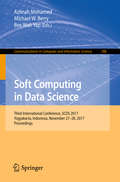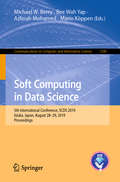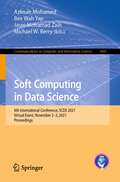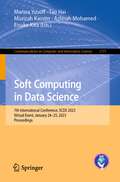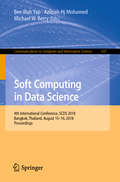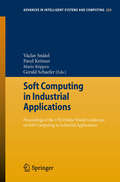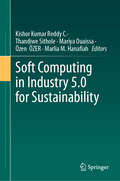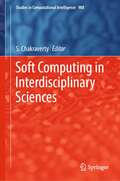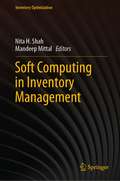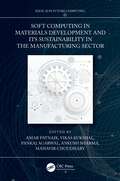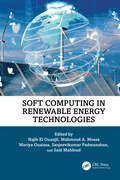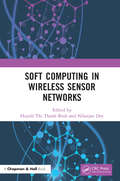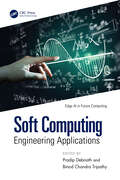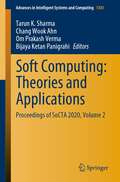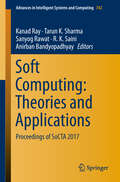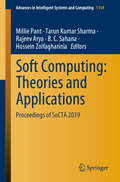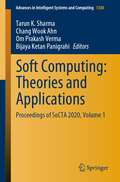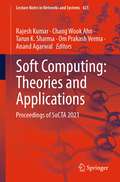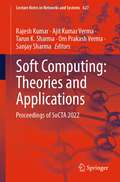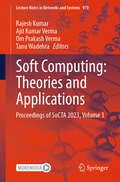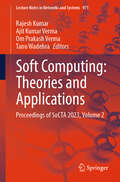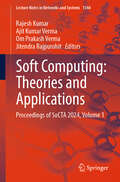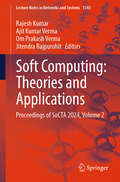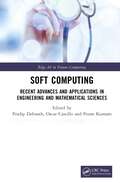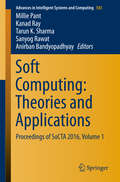- Table View
- List View
Soft Computing in Data Science
by Michael W. Berry Bee Wah Yap Azlinah MohamedThis book constitutes the refereed proceedings of the International Conference on Soft Computing in Data Science, SCDS 2015, held in Putrajaya, Malaysia, in September 2015. The 25 revised full papers presented were carefully reviewed and selected from 69 submissions. The papers are organized in topical sections on data mining; fuzzy computing; evolutionary computing and optimization; pattern recognition; human machine interface; hybrid methods.
Soft Computing in Data Science: 5th International Conference, SCDS 2019, Iizuka, Japan, August 28–29, 2019, Proceedings (Communications in Computer and Information Science #1100)
by Michael W. Berry Mario Köppen Bee Wah Yap Azlinah MohamedThis book constitutes the refereed proceedings of the 5th International Conference on Soft Computing in Data Science, SCDS 2019, held in Iizuka, Japan, in August 2019. The 30 revised full papers presented were carefully reviewed and selected from 75 submissions. The papers are organized in topical sections on information and customer analytics; visual data science; machine and deep learning; big data analytics; computational and artificial intelligence; social network and media analytics.
Soft Computing in Data Science: 6th International Conference, SCDS 2021, Virtual Event, November 2–3, 2021, Proceedings (Communications in Computer and Information Science #1489)
by Michael W. Berry Bee Wah Yap Azlinah Mohamed Jasni Mohamad ZainThis book constitutes the refereed proceedings of the 6th International Conference on Soft Computing in Data Science, SCDS 2021, which was held virtually in November 2021. The 31 revised full papers presented were carefully reviewed and selected from 79 submissions. The papers are organized in topical sections on AI techniques and applications; data analytics and technologies; data mining and image processing; machine & statistical learning.
Soft Computing in Data Science: 7th International Conference, SCDS 2023, Virtual Event, January 24–25, 2023, Proceedings (Communications in Computer and Information Science #1771)
by Marina Yusoff Azlinah Mohamed Tao Hai Murizah Kassim Eisuke KitaThis book constitutes the refereed proceedings of the 7th International Conference on Soft Computing in Data Science, SCDS 2023, which was held virtually in January 2023. The 21 revised full papers presented were carefully reviewed and selected from 61 submissions. The papers are organized in topical sections on artificial intelligence techniques and applications; computing and optimization; data analytics and technologies; data mining and image processing; mathematical and statistical learning.
Soft Computing in Data Science: First International Conference, Scds 2015, Putrajaya, Malaysia, September 2-3, 2015, Proceedings (Communications In Computer And Information Science #545)
by Michael W. Berry Bee Wah Yap Azlinah Hj MohamedThis book constitutes the refereed proceedings of the 4th International Conference on Soft Computing in Data Science, SCDS 2018, held in Bangkok, Thailand, in August 2018.The 30 revised full papers presented were carefully reviewed and selected from 75 submissions. The papers are organized in topical sections on machine and deep learning, image processing, financial and fuzzy mathematics, optimization algorithms, data and text analytics, data visualization.
Soft Computing in Industrial Applications
by Václav Snášel Pavel Krömer Mario Köppen Gerald SchaeferThis volume of Advances in Intelligent Systems and Computing contains accepted papers presented at WSC17, the 17th Online World Conference on Soft Computing in Industrial Applications, held from December 2012 to January 2013 on the Internet. WSC17 continues a successful series of scientific events started over a decade ago by the World Federation of Soft Computing. It brought together researchers from over the world interested in the ever advancing state of the art in the field. Continuous technological improvements make this online forum a viable gathering format for a world class conference. The aim of WSC17 was to disseminate excellent research results and contribute to building a global network of scientists interested in both theoretical foundations and practical applications of soft computing. The 2012 edition of the Online World Conference on Soft Computing in Industrial Applications consisted of general track and special session on Continuous Features Discretization for Anomaly Intrusion Detectors Generation and special session on Emerging Theories and Applications in Transportation Science. A total of 33 high quality research papers were accepted after a rigorous review process and are provided in this book.
Soft Computing in Industry 5.0 for Sustainability
by Mariya Ouaissa Kishor Kumar Reddy C. Thandiwe Sithole Özen Özer Marlia M. HanafiahSoft computing and Industry 5.0 are two distinct concepts that, when combined, can have a significant impact on sustainability initiatives within various industries. Soft computing is a subfield of artificial intelligence (AI) that aims to address problems characterized by uncertainty, imprecision, and partial truth. It encompasses various computational techniques, such as fuzzy logic, neural networks, genetic algorithms, and machine learning, which enable machines to deal with complex and uncertain data in a more human-like manner. Soft computing techniques are particularly valuable in sustainability efforts because they can handle non-linear relationships and uncertain data that often arise in environmental and social contexts. For example, they can be used to optimize energy consumption, waste management, and resource allocation in industries by considering various factors and trade-offs. The book highlights the latest innovations in intelligent systems in classical machine learning, deep learning, Internet of Things (IoT), Industrial Internet of Things (IIoT), blockchain, knowledge representation, knowledge management, big data, and natural language processing. (NLP). The book contains many contemporary articles from both scientists and practitioners working in many fields where soft computing, intelligent systems and the IIoT can break new ground. Intelligent systems and the Internet of Things are now essential technologies in almost every field. From agriculture to industry to healthcare, the scope of smart systems and IIoT is as wide as the horizon. Nowadays, these technologies are extensively used in developed countries, but they are still at an early stage in emerging countries. The primary market of this book is senior undergraduate students, post graduate students, practitioners, researchers, academicians, industrialists, and professionals working in areas of core computer science, electrical engineering, mechanical engineering, environmental engineering and agricultural engineering. The secondary audience of this book is individuals working in the areas of manufacturing, agriculture, remote sensing, environmental engineering, health care, smart cities, smart farming, remote sensing, supply chain management and hydrology.
Soft Computing in Interdisciplinary Sciences (Studies in Computational Intelligence #988)
by S. ChakravertyThis book meets the present and future needs for the interaction between various science and technology/engineering areas on the one hand and different branches of soft computing on the other. Soft computing is the recent development about the computing methods which include fuzzy set theory/logic, evolutionary computation (EC), probabilistic reasoning, artificial neural networks, machine learning, expert systems, etc. Soft computing refers to a partnership of computational techniques in computer science, artificial intelligence, machine learning, and some other engineering disciplines, which attempt to study, model, and analyze complex problems from different interdisciplinary problems. This, as opposed to traditional computing, deals with approximate models and gives solutions to complex real-life problems. Unlike hard computing, soft computing is tolerant of imprecision, uncertainty, partial truth, and approximations. Interdisciplinary sciences include various challenging problems of science and engineering. Recent developments in soft computing are the bridge to handle different interdisciplinary science and engineering problems. In recent years, the correspondingly increased dialog between these disciplines has led to this new book. This is done, firstly, by encouraging the ways that soft computing may be applied in traditional areas, as well as point towards new and innovative areas of applications and secondly, by encouraging other scientific disciplines to engage in a dialog with the above computation algorithms outlining their problems to both access new methods as well as to suggest innovative developments within itself.
Soft Computing in Inventory Management (Inventory Optimization)
by Nita H. Shah Mandeep MittalThis book presents a collection of mathematical models that deals with the real scenario in the industries. The primary objective of this book is to explore various effective methods for inventory control and management using soft computing techniques. Inventory control and management is a very tedious task faced by all the organizations in any sector of the economy. It makes decisions for policies, activities, and procedures in order to make sure that the right amount of each item is held in stock at any time. Many industries suffer from indiscipline while ordering and production mismatch. It is essential to provide best ordering policy to control such kind of mismatch in the industries. All the mathematical model solutions are provided with the help of various soft computing optimization techniques to determine optimal ordering policy. This book is beneficial for practitioners, educators, and researchers. It is also helpful for retailers/managers for improving business functions and making more accurate and realistic decisions.
Soft Computing in Materials Development and its Sustainability in the Manufacturing Sector (Edge AI in Future Computing)
by Amar Patnaik Vikas Kukshal Pankaj Agarwal Ankush Sharma Mahavir ChoudharyThis book focuses on the application of soft computing in materials and manufacturing sectors with the objective to offer an intelligent approach to improve the manufacturing process, material selection and characterization techniques for developing advanced new materials. It unveils different models and soft computing techniques applicable in the field of advanced materials and solves the problems to help the industry and scientists to develop sustainable materials for all purposes. The book focuses on the overall well-being of the environment for better sustenance and livelihood. Firstly, the authors discuss the implementation of soft computing in the various areas of engineering materials. They also review the latest intelligent technologies and algorithms related to the state-of-the-art methodologies of monitoring and effective implementation of sustainable engineering practices. Finally the authors examine the future generation of sustainable and intelligent monitoring techniques beneficial for manufacturing, and cover novel soft computing techniques for the purpose of effective manufacturing processes at par with the standards laid down by the International Standards of Organization (ISO). This book is intended for academics and researchers from all the fields of engineering interested in joining interdisciplinary initiatives on soft computing techniques for advanced materials and manufacturing.
Soft Computing in Renewable Energy Technologies (Advances in Digital Technologies for Smart Applications)
by Sanjeevikumar Padmanaban Mariya Ouaissa Mahmoud A. Mossa Najib El Ouanjli Said MahfoudThis book addresses and disseminates state-of-the-art research and development in the applications of soft computing techniques for renewable energy systems. It covers topics such as solar energy, wind energy, and solar concentrator technologies, as well as building systems and power generation systems. In all these areas, applications of soft computing methods such as artificial neural networks, genetic algorithms, particle swarm optimization, cuckoo search, fuzzy logic, and a combination of these, called hybrid systems, are included. This book is a source for students interested in the fields of renewable energy and the application of the soft computing. In addition, our book can be considered as a reference for researchers and academics since it will include applications of soft computing in different renewable energy systems.
Soft Computing in Wireless Sensor Networks
by Nilanjan Dey Huynh Thi Thanh BinhThis book focuses on the suitable methods to solve optimization problems in wireless network system utilizing digital sensors like Wireless Sensor Network. This kind of system has been emerging as the cornerstone technology for all new smart devices and its direct application in many fields in life.
Soft Computing: Engineering Applications (ISSN)
by Pradip Debnath Binod Chandra TripathyThis book examines the latest developments in the area of soft computing with engineering applications. It explores topics such as fuzzy sets, intuitionistic fuzzy sets, unmanned aerial vehicles, soft sets, neutrosophic sets, fractional calculus, big data analytics, and the mathematical foundations of convolutional neural network (CNNs). Soft Computing: Engineering Applications offers readers a comprehensive and in-depth understanding of various cutting-edge technologies that are transforming industries worldwide. The book explores soft computing techniques in a very systematic manner. It elucidates the concepts, theories, and applications of fuzzy sets, enabling readers to grasp the fundamentals and explore their applications in various fields. It provides new insight into unmanned aerial vehicle applications to fuzzy soft set based decision making. It then discusses new fixed point results in orthogonal neutrosophic generalized metric spaces and explores statistical convergence of triple sequences in a credibility space. The authors then provide readers with a solid grasp of the mathematical underpinnings of CNNs, enabling them to design, train, and optimize neural networks for image recognition, object detection, and other computer vision tasks. The authors also present new studies in fractional calculus and explores advanced visualization algorithms and techniques for big data analytics.Soft Computing will be useful for beginners and advanced researchers in engineering, applied sciences and healthcare professionals working in soft computing applications.
Soft Computing: Proceedings Of Socta 2020, Volume 1 (Advances In Intelligent Systems And Computing Ser. #1380)
by Bijaya Ketan Panigrahi Tarun K. Sharma Om Prakash Verma Chang Wook AhnThis book focuses on soft computing and how it can be applied to solve real-world problems arising in various domains, ranging from medicine and healthcare, to supply chain management, image processing and cryptanalysis. It gathers high-quality papers presented at the International Conference on Soft Computing: Theories and Applications (SoCTA 2020), organized online. The book is divided into two volumes and offers valuable insights into soft computing for teachers and researchers alike; the book will inspire further research in this dynamic field.
Soft Computing: Proceedings of SoCTA 2017 (Advances in Intelligent Systems and Computing #742)
by Kanad Ray Tarun K. Sharma Sanyog Rawat Anirban Bandyopadhyay R. K. SainiThe book focuses on soft computing and its applications to solve real-world problems occurring in different domains ranging from medicine and healthcare, and supply chain management to image processing and cryptanalysis. It includes high-quality papers presented in the International Conference on Soft Computing: Theories and Applications (SoCTA 2017), organized by Bundelkhand University, Jhansi, India. Offering significant insights into soft computing for teachers and researchers alike, the book inspires more researchers to work in the field of soft computing.
Soft Computing: Proceedings of SoCTA 2019 (Advances in Intelligent Systems and Computing #1154)
by Millie Pant Tarun Kumar Sharma Rajeev Arya B. C. Sahana Hossein ZolfaghariniaThis book focuses on soft computing and how it can be applied to solve real-world problems arising in various domains, ranging from medicine and healthcare, to supply chain management, image processing and cryptanalysis. It gathers high-quality papers presented at the International Conference on Soft Computing: Theories and Applications (SoCTA 2019), organized by the National Institute of Technology Patna, India. Offering valuable insights into soft computing for teachers and researchers alike, the book will inspire further research in this dynamic field.
Soft Computing: Proceedings of SoCTA 2020, Volume 1 (Advances in Intelligent Systems and Computing #1380)
by Bijaya Ketan Panigrahi Tarun K. Sharma Om Prakash Verma Chang Wook AhnThis book focuses on soft computing and how it can be applied to solve real-world problems arising in various domains, ranging from medicine and healthcare, to supply chain management, image processing and cryptanalysis. It gathers high-quality papers presented at the International Conference on Soft Computing: Theories and Applications (SoCTA 2020), organized online. The book is divided into two volumes and offers valuable insights into soft computing for teachers and researchers alike; the book will inspire further research in this dynamic field.
Soft Computing: Proceedings of SoCTA 2021 (Lecture Notes in Networks and Systems #425)
by Rajesh Kumar Tarun K. Sharma Om Prakash Verma Chang Wook Ahn Anand AgarwalThis book focuses on soft computing and how it can be applied to solve real-world problems arising in various domains, ranging from medicine and healthcare, to supply chain management, image processing, and cryptanalysis. It gathers high-quality papers presented at the International Conference on Soft Computing: Theories and Applications (SoCTA 2021), organized online. The book offers valuable insights into soft computing for teachers and researchers alike; the book will inspire further research in this dynamic field.
Soft Computing: Proceedings of SoCTA 2022 (Lecture Notes in Networks and Systems #627)
by Ajit Kumar Verma Sanjay Sharma Rajesh Kumar Tarun K. Sharma Om Prakash VermaThis book focuses on soft computing and how it can be applied to solve real-world problems arising in various domains, ranging from medicine and health care, to supply chain management, image processing and cryptanalysis. It gathers high-quality papers presented at the International Conference on Soft Computing: Theories and Applications (SoCTA 2022), held at University Institute of Technology, Himachal Pradesh University Shimla, Himachal Pradesh, India. The book offers valuable insights into soft computing for teachers and researchers alike; the book inspires further research in this dynamic field.
Soft Computing: Proceedings of SoCTA 2023, Volume 1 (Lecture Notes in Networks and Systems #970)
by Ajit Kumar Verma Rajesh Kumar Om Prakash Verma Tanu WadehraThis book focuses on soft computing and how it can be applied to solve real-world problems arising in various domains, ranging from medicine and healthcare, to supply chain management, image processing, and cryptanalysis. It gathers high-quality papers presented at the International Conference on Soft Computing: Theories and Applications (SoCTA 2023), held at Indian Institute of Information Technology (IIIT) Una, Himachal Pradesh, India, during 21–23 December 2023. The book offers valuable insights into soft computing for teachers and researchers alike; the book inspires further research in this dynamic field.
Soft Computing: Proceedings of SoCTA 2023, Volume 2 (Lecture Notes in Networks and Systems #971)
by Ajit Kumar Verma Rajesh Kumar Om Prakash Verma Tanu WadehraThis book focuses on soft computing and how it can be applied to solve real-world problems arising in various domains, ranging from medicine and healthcare, to supply chain management, image processing, and cryptanalysis. It gathers high-quality papers presented at the International Conference on Soft Computing: Theories and Applications (SoCTA 2023), held at Indian Institute of Information Technology (IIIT) Una, Himachal Pradesh, India, during 21–23 December 2023. The book offers valuable insights into soft computing for teachers and researchers alike; the book inspires further research in this dynamic field.
Soft Computing: Proceedings of SoCTA 2024, Volume 1 (Lecture Notes in Networks and Systems #1344)
by Ajit Kumar Verma Rajesh Kumar Om Prakash Verma Jitendra RajpurohitThe book is a collection of high-quality papers presented at the International Conference on Soft Computing: Theories and Applications (SoCTA 2024), held at Malaviya National Institute of Technology (MNIT) Jaipur, Rajasthan, India, during 27–29 December 2024. This book focuses on soft computing and how it can be applied to solve real-world problems arising in various domains, ranging from medicine and healthcare, to supply chain management, image processing, and cryptanalysis. The book offers valuable insights into soft computing for teachers and researchers alike; the book inspires further research in this dynamic field.
Soft Computing: Proceedings of SoCTA 2024, Volume 2 (Lecture Notes in Networks and Systems #1343)
by Ajit Kumar Verma Rajesh Kumar Om Prakash Verma Jitendra RajpurohitThe book is a collection of high-quality papers presented at the International Conference on Soft Computing: Theories and Applications (SoCTA 2024), held at Malaviya National Institute of Technology (MNIT) Jaipur, Rajasthan, India, during 27–29 December 2024. This book focuses on soft computing and how it can be applied to solve real-world problems arising in various domains, ranging from medicine and healthcare, to supply chain management, image processing, and cryptanalysis. The book offers valuable insights into soft computing for teachers and researchers alike; the book inspires further research in this dynamic field.
Soft Computing: Recent Advances and Applications in Engineering and Mathematical Sciences (Edge AI in Future Computing)
by Oscar Castillo Poom Kumam Pradip Debnath Sushil Kumar SolankiThis book explores soft computing techniques in a systematic manner starting from their initial stage to recent developments in this area. The book presents a survey of the existing knowledge and the current state-of-the-art development through cutting-edge original new contributions from the researchers. Soft Computing: Recent Advances and Applications in Engineering and Mathematical Sciences presents a survey of the existing knowledge and the current state-of-the-art development through cutting-edge original new contributions from the researchers. As suggested by the title, this book particularly focuses on the recent advances and applications of soft computing techniques in engineering and mathematical sciences. Chapter 1 describes the contribution of soft computing techniques towards a new paradigm shift. The subsequent chapters present a systematic application of fuzzy logic in mathematical sciences and decision-making. New research directions are also provided at the end of each chapter. The application of soft computing in health sciences and in the modeling of epidemics including the effects of vaccination are also examined. Sustainability of green product development, optimum design of 3D steel frame, digitalization investment analysis in the maritime industry, forecasting return rates of individual pension funds are among some of the topics where engineering and industrial applications of soft computing have been studied in the book. The readers of this book will require minimum prerequisites of undergraduate studies in computation and mathematics. This book is meant for graduate students, faculty, and researchers who are applying soft computing in engineering and mathematics. New research directions are also provided at the end of each chapter.
Soft Computing: Theories and Applications
by Millie Pant Kanad Ray Tarun K. Sharma Sanyog Rawat Anirban BandyopadhyayThis book focuses on soft computing and its applications to solve real-life problems occurring in different domains ranging from medical and health care, supply chain management and image processing to cryptanalysis. It presents the proceedings of International Conference on Soft Computing: Theories and Applications (SoCTA 2016), offering significant insights into soft computing for teachers and researchers and inspiring more and more researchers to work in the field of soft computing. >The term soft computing represents an umbrella term for computational techniques like fuzzy logic, neural networks, and nature inspired algorithms. In the past few decades, there has been an exponential rise in the application of soft computing techniques for solving complex and intricate problems arising in different spheres of life. The versatility of these techniques has made them a favorite among scientists and researchers working in diverse areas. SoCTA is the first international conference being organized at Amity University Rajasthan (AUR), Jaipur. The objective of SoCTA 2016 is to provide a common platform to researchers, academicians, scientists, and industrialists working in the area of soft computing to share and exchange their views and ideas on the theory and application of soft computing techniques in multi-disciplinary areas. The aim of the conference is to bring together young and experienced researchers, academicians, scientists, and industrialists for the exchange of knowledge. SoCTA especially encourages the young researchers at the beginning of their career to participate in this conference and present their work on this platform.
